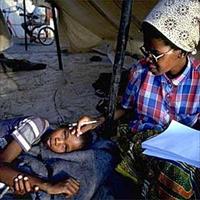LIBERIA: Health user fees - helpful or harmful?

Representatives of government, NGOs, the UN and donors in Liberia are probing the merits and drawbacks of health care fees, as the government weighs whether to maintain free services in public facilities.
In a national health policy released last month the government said that due in part to “crushing poverty” it was maintaining a suspension of fees for primary care pending further study.
As part of the government’s deliberations, a broad-based committee is studying the impact of user fees for primary health care and options for financing the health sector. The research is in part to show the level of revenue gained from fees contrasted with the extent fees keep people away from health services, one development expert in Liberia said. Many who advocate lifting fees say they do not contribute significantly to government coffers.
Liberia’s health policy document says, “In light of crushing levels of poverty, the Ministry [of health and social welfare] has decided to suspend the administration of user fees at the primary health care level.”
The policy says the suspension “will remain in place until the socio-economic situation improves and financial management systems perform to a level that ensures the proper extraction, accounting and utilisation of revenues.”
In the meantime the government will study private health spending in order to formulate a “pro-poor comprehensive health financing policy”.
What next?
NGOs backing free care are pleased with the suspension of fees but say they are concerned about what that financing policy will eventually look like.
“We’re happy Liberia is maintaining free health care,” Sebastian Roy, Médecins Sans Frontières Belgium’s operational coordinator for West Africa, told IRIN. “But the question is for how long and how are they going to finance their free access? They will have to be supported by international donors to do so."
For fiscal year 2007-08 the health budget is US$10.9 million of a total budget of just under $200 million. Deputy Health Minister Bernice Dahn told IRIN, “Due to our limited budget…the government is limited in how it can sustain [the health system], including providing drugs and medical supplies and paying health workers.”
For now international aid groups continue to support most public health facilities but this will not always be the case.
MSF and other NGOs call on the international community to commit more to shoring up poor countries’ health systems, arguing that even the often-touted national health insurance schemes – while less “damaging” than user fees – still put too great a burden on the population.
“International funds are compulsory”, said Hélène Lorinquer, MSF-B analysis and advocacy coordinator. “In the absence of [predictable and reliable] international funding the government turns to sources of funding…such as contributions by the population and patients”.
MSF-B says donors and international organisations pushing the Millennium Development Goals – notably to reduce child mortality by two-thirds by 2015 – should not at the same time promote health user fees. “User fees go directly against the MDGs,” Lorinquer said. “With health user fees you are impoverishing people and blocking health care.”
MSF-B says it is “seriously concerned” by declarations by the World Bank to find “sustainable” solutions for free care if donor funds run out. “The objective should be to make sure that donor funding does not run out, but increases to a level that allows Liberia to provide an appropriate response to the health crisis it faces.”
How to pay
World Bank health economist Alex Preker said the World Bank and other donors are working on ways to mobilise funds for the health sector. He said the World Bank does not support user fees, as is commonly assumed. “We’re neither for nor against user fees – what we’re for is that the poor and children have access to health care.”
But, he said, “things have to be economically sound….Somebody has to pay the providers. You have to come in and replace user fees with [some financing mechanism]. There is no such thing as totally free health care.”
Some African countries have instituted health care insurance schemes whereby premiums are paid through taxes or other means. Advocates of this approach say it helps maintain the health sector while facilitating access.
The UK’s Department for International Development (DFID), also taking part in the research into health-care financing, says user fees are likely to do more harm than good in a setting like Liberia.
“We think the evidence is clear that user fees are not desirable because they don't attract a lot of revenue in a typical African country, but nonetheless act as a significant disincentive for poor people to seek health care,” Desmond Curran of DFID in Liberia told IRIN.
The Health Ministry’s Dahn told IRIN the committee is expected to complete a report by mid-2008, laying out “the advantages and disadvantages of maintaining or suspending user fees”.
See Also
- ETHIOPIA: Government boost for universal primary healthcare
- MAURITANIA: Discrimination, staff shortages mean mental health short changed
- We will make poverty history - President Jammeh
- COTE D'IVOIRE: Diabetes sufferers call for government action on "neglected" disease
- COMOROS: Instability spells decline
 Back and Next - Back and Next
Back and Next - Back and Next See Also - See Also
See Also - See Also